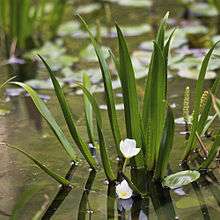Stratiotes aloides
| Stratiotes aloides | |
|---|---|
 | |
| Stratiotes aloides | |
| Scientific classification | |
| Kingdom: | Plantae |
| (unranked): | Angiosperms |
| (unranked): | Monocots |
| Order: | Alismatales |
| Family: | Hydrocharitaceae |
| Genus: | Stratiotes |
| Species: | S. aloides |
| Binomial name | |
| Stratoides aloides L. | |
| Synonyms | |
| |
Statiotes aloides, commonly known as the water soldiers[1] or water pineapple, is a submerged aquatic plant native to Europe and northwestern Asia. In Britain it was once common in East Anglia and still is in many places, particularly wet ditches and healthy ponds. It is the only species in the genus Stratiotes.
Invasive Species
Stratiotes aloides has been found in the Trent River in eastern Ontario, Canada.[2]
Description
Stratiotes aloides has a rosette of serrated leaves. White flowers are produced in the summer.
Ecological aspects
In the summer this plant floats on the water surface with the leaves just above the surface. In the Autumn they become covered with a slimy secretion (calcium carbonate) and the whole plant sinks to the bottom to rise again in the Spring. Fossils have been found of this plant.
Plants are dioecious, male and female plants must be grown if seed is required. Only the female plant occurs naturally in Britain, though plants with hermaphrodite flowers are also found occasionally. Seed is never set in Britain, the plants increasing mainly by offsets. [3]
Cultivation
Most suitable for the cool aquarium or pond.
Propagation from runners which form from the centre of the rosette of leaves.
The herb has had a high reputation for treating wounds, especially when these are made by an iron implement. It is applied externally. The plant is also said to be of use in the treatment of St. Anthony's Fire and also of bruised kidneys. [4]
References
- ↑ "Stratiotes aloides". Natural Resources Conservation Service PLANTS Database. USDA. Retrieved 3 December 2015.
- ↑ http://www.bqrap.ca/cms_lib/watersoldierPosterLOWRES.PDF
- ↑ Clapham, Tootin and Warburg
- ↑ Grieve, A Modern Herbal. Penguin (1984)
- Clapham, Tootin and Warburg. Flora of the British Isles. Cambridge University Press 1962